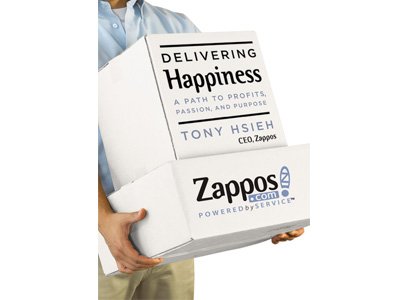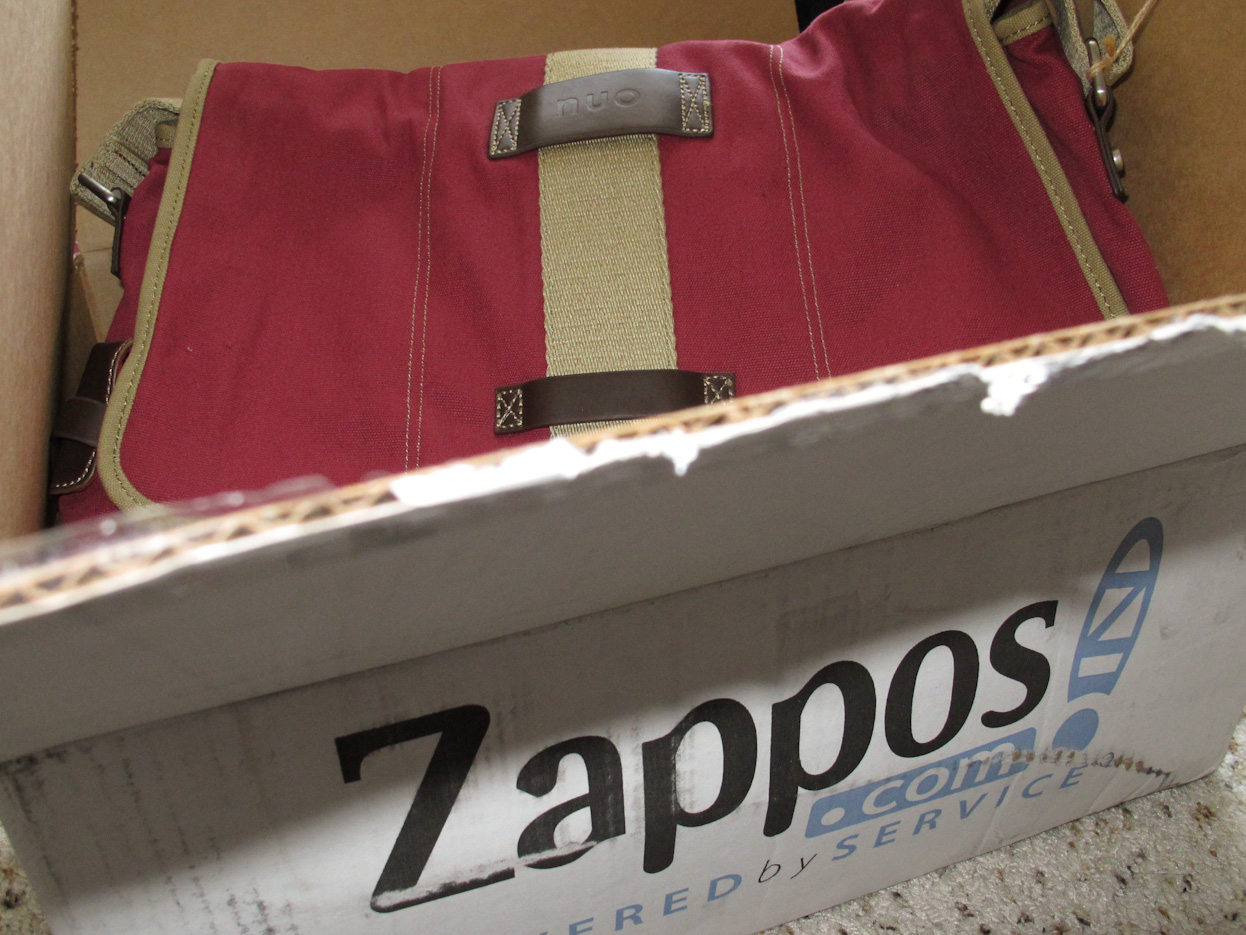This may be the only time I time I title a post after a Rihanna song. It’s not exactly like I’m saving to see her in concert anytime soon, but her music is hard to avoid, and it is catchy. As they say, when in Rome. That is what they say, is it not, my friends, countrymen, and well … Romans?
No, that’s not a savvy business opening about the highly regarded billion-dollar company. Nor is it the classic scene-kid, hipster opener. Be that as it may, I gave you Rihanna and Shakespeare (sort-of) in one paragraph. Plus there are hints of what’s to come. This is not going to be the typical Zappos write-up, folks. It’s more of a personal take, but I hope it’ll still be informative in its own way.
There are more significant reasons for the title beyond the Rihanna tie-in. Part of it relates to Jason Calacanis’s opening comments about Zappos in this video:
(If you’re only going to watch one or two videos in this post, hold off on this one, but this is a good video to watch after you’ve finished reading and want to learn more about the business side of Zappos.)
As Jason explains, CEO Tony Hsieh made the once boring shoe business seem cool and turned the oft-dismissed customer service position into something desirable and joyous. Those kinds of dramatic reversals get my attention, but was it all just hype? I was curious enough to pick up Tony’s book Delivering Happiness.
Technically Tony Hsieh did not found Zappos. Nick Swinmum did that in 1999, but Tony is the guy who turned the company ethos into the defining attribute of Zappos. That’s why Tony’s book is such a revealing glimpse into what makes Zappos so special.
After all, there are lots of online fashion vendors, but there is only one Zappos. Why is that?
In his book, Tony explains that the company’s success is due to its core values and its sense of purpose. Zappos does not exist just to make money. “Zappos is about delivering happiness to the world,” he asserts.
When I first read the book, I was a little skeptical. That’s a clever slogan, but how is it different from all the other self-serving things that business leaders or celebrities say about their endeavors? After all, don’t most companies have a list of core values and grand mission statements that have very little to do with how they operate on a daily basis?
Still, I kept hearing things about how Zappos was different. Maybe a closer look was merited.
In Delivering Happiness, Tony mentions that Zappos prints an annual Culture Book where employees freely share their thoughts about the company and its core values. The employees’s comments are not edited, and this Culture Book is freely available to anyone who requests it. (You can get your own copy here.)
OK, that’s a little different.
Eventually I received my own copy. I was expecting mostly polished marketing prose with a few choice employee quotes, but the book is almost entirely comprised of quotes from employees, vendors, and customers of Zappos interspersed among photos of Zapponians socializing or doing zany things. (The word “Zapponians” is an official company term used to showcase the unique denizens of Zappos: http://blogs.zappos.com/tags/zapponians.)
Even more surprising was how often the company’s core values showed up in playful graphical arrangements. It’s almost as if these core values aren’t meant to be buried with their brothers at the bottom of a bureaucrat’s filing cabinet. They are placed front and center, challenging observers to measure the company’s success against the values it claims. Here they are :
1. Deliver WOW Through Service
2. Embrace and Drive Change
3. Create Fun and a Little Weirdness
4. Be Adventurous, Creative, and Open-Minded
5. Pursue Growth and Learning
6. Build Open and Honest Relationships With Communication
7. Build a Positive Team and Family Spirit
8. Do More With Less
9. Be Passionate and Determined
10. Be Humble
When I re-read Delivering Happiness to prepare for this post, I realized that the book is sort of an origin story about how the values of Zappos came into existence.
Tony establishes transparency right from the start when he admits that he’d rather be grammatically incorrect than write in such a way as to distort the way he normally talks. He talks about how he discovered his passion for creating memorable experiences for others and how he’s come to value creativity and humility. Even the way he quotes sources as disparate as Ghandi and Winnie the Pooh serves to reinforce the core values he identifies behind Zappos.
There is something inspiring about people, about institutions who are devoted to more than the obvious. After all, when was the last time you remember thinking, “oh hey, you do everything possible to get more money, power, and sex? How very original and inspired of you!”
In contrast, idealists by their very nature encourage the belief in a higher purpose. If these types will fight for ideals, then maybe there really are ideals worth fighting for. But let’s be honest, idealists make it tougher for the rest of us to justify our more complacent ways.
I want to be an idealist, but I’ve experienced enough to know that life doesn’t always work out as we hope it should. And so, peddlers of purpose like Zappos have to get past my cynical side before they have a chance at my heart. I’m not the only one like that.
I’ll tell you how I tested the ideals of Zappos in just a moment, but first allow me to make to make a quick reference to the United States. There is a connection: Zappos claims to be a values-driven company, and the United States is considered by many historians to be the first country that came into existence not because of ethnic ties but because of a shared set of values.
When the Founders risked their lives to declare that “all men are created equal, that they are endowed by their Creator with certain unalienable Rights” the world took notice. A Declaration of Independence aimed at the world’s most powerful king who strove to control the lives of the American Colonists was indeed a bold and heretofore unseen gesture.
Eventually the novelty of the Declaration wore off and cosmopolitan observers started to wonder why a nation formed around the inherent freedoms and rights of mankind also sustained the institution of slavery. Did these Americans really believe their rhetoric? Some of them did. They proved as much by fighting for their ideals, when it would have been more convenient to do otherwise.
That’s what I wanted to find out about Zappos. Would they actually live up to their ideals when it might be easier to do otherwise? Early research suggested that they already did.
The company offers free shipping both ways and a 365-day return policy to make it a better experience for those uncertain about buying online. They have 24-hour support, 7 days a week, and they prominently display their phone number on their site, even though burying it several links deep would reduce call volume, which would translate into less money spent on support.
In 2009, Zappos finally made the list of Fortune’s 10p 100 Companies to Work For. Back then they came in at No. 23. Now they’re No. 11 on the list, so they must be doing something to keep their employees happy.
Still, I had to find out for myself if they were the real deal, so on May 29th I called Zappos for the very first time with an unusual request. Here’s what happened:
I’m fairly certain that the Zappos employees were never trained on what to do if a caller requests to do a song over the phone. (If they do train in such matters, I’d really like to read the policy that explains how to handle the situation!)
Besides, if Zappos employees were trained just to maximize profit, I don’t imagine the song would have happened. At the very least, Kimberly would have put me on hold to check with her manager, but to her credit she went along with my request in a good-natured manner and performed beautifully in an unexpected situation. That’s what can happen when you train based on values rather than policies.
Kimberly was adventurous, creative, and open-minded and was willing to do something a little weird in the pursuit of fun. She more than embodied the company’s core values.
It is also worth mentioning that I called in the early evening, about the time when West-Coast callers would be getting out of work and calling. More than likely, Kimberly already went through a wide range of calls by the time she got to me, but she still sounded friendly and engaged. I bought this bag to say thanks.
The Zappos call was the first time I’ve discussed the concept behind my upcoming short. I’m a little nervous about it. If it doesn’t get a good reception, I probably won’t have the heart to do another project for a while, so the song wasn’t just a silly exercise. It was me taking a risk in sharing something that has a strong personal significance to me.
Sure, there was a chance to gain some publicity, but there was also a chance that I’d fail miserably and feel really foolish. I took a risk because I figured Zappos might really believe in the values they claim. Needless to say, there’s not another company in the world with which I could imagine doing an impromptu song with a customer service rep.
I actually did two songs with Kimberly. The second one I did was about my sister who is getting married. I was undecided about sharing the second song. I thought about just sharing it with my sister. I don’t mind looking foolish, but I don’t want to do something to cast a bad light on her. Plus I didn’t want to do something that felt like I was using her wedding for personal gain.
I wrestled with this for a while, but then I figured I would include it because it might help others. The societal impulse to purge anything personal from our professional interactions makes me a little sad. Isn’t it more honest to acknowledge the people who inspire us to be the best versions of ourselves than to pretend that we only care about profit margins and growth rates while working?
(Update: Now that the wedding is over, I’ve added some photos that I took of my sister during the wedding and the build up to it. The photos are another way to nicely accent the personal side of a company like Zappos and this post. To entirely separate the business side of things from the personal is a very bizarre modern tendency, one that causes unnecessary problems for both sides.)
Corinne by the lake where Sean first proposed. The swans were also there when he proposed.
Also, why does everything we do in public have to be perfect? I lost some of the joy of photography when I felt like I should only share photos that were of a certain professional quality. I spent unnecessary time trying to finesse casual shots so that they might be acceptable to critics, and I started taking less photos as a result.
Fortunately, a few talented photographers helped me realize that it is OK to share the occasional snapshots along with the more polished one. If others can’t distinguish between casual shots and professional work, then to hell with them.
I do not consider myself to be a great singer, but I do enjoy singing. In regards to the song about my sister, I sang in an earnest way about someone who means a lot to me. Besides, I’d like to think that my little song embodies some of the Zappos values. Specifically it is honest and relationship minded, and it engenders a family spirit. With that said, here is the song:
I didn’t explain as much in the video, but a large part of Na-Na & Water Bottle involved improvising a song based on whatever was randomly discovered while scrubbing through radio stations. It makes perfect sense then that a tribute to Na-Na & Water Bottle would involve a randomly selected Zappos support representative.
After the song, I ordered a purse that I thought my sister would enjoy. (Don’t tell her. The wedding is not until June 16th. Maybe after that I’ll post pictures!)
Corinne and Sean by the lake.
When Kimberly realized that the purse was for my sister’s wedding, she arranged for expedited shipping, so I got the package in less than a week from when I placed the order. I’ll admit it: they wowed me.
After I hung up with Kimberly, I remember being in a better mood than usual. I walked around and hummed to myself random bits of music. The Zappos team had succeeded in delivering happiness to me even before my package arrived.
This story almost didn’t happen though. Prior to writing this, I had shared the videos with Sean, one of the leads at Zappos. The company had treated me with consideration, plus I was uncertain about how the videos would be received, so I figured I wouldn’t post them if the Zappos people hated them.
Sean responded promptly, surprising me with her enthusiasm and a refreshing lack of business formality that normally comes from manager types. So far so good. But, there were legal concerns. Oh.
Corinne and the wedding photographer get some shots before the wedding.
Sean agreed to check with the legal department to see if anything could be done to alleviate those concerns. After a few days had passed I figured that they weren’t going to allow the videos to be posted. This was going to be another almost for me.
I know a little something about almosts. So many of my relationships and my endeavors have been almosts. It almost worked out with her and her and her. That project was almost good enough to win, to get selected, to get off the ground. Almost. They do take some of the fight out of me, those ever-present almosts. I don’t know how many more of them I can take before I stop trying.
Every indication was starting to suggest that the Zappos videos would be another almost. What if the same thing happens with my short comedy?
The maid of honor, my other sister Parthena, helps Corinne get into position.
That very thinking led me to Monsieur’s, an upscale seafood restaurant in Baton Rouge, just one day before I started writing this. Being alone, I treated myself to an $80 lunch.
I’ve never had an $80 lunch before; I’m not usually an extravagant guy, but things have been, shall we say challenging, of late. Also Monsieur’s makes excellent oysters. And Bloody Marys. And bread pudding. Etc.
That day, I came very close to doing something I would have regretted. I wasn’t in a completely hopeless place, but it was pretty close. Then, I got another email from Sean after lunch. She said that I could use the videos if I removed the Zappos logos. Doable, I thought.
Corinne and Sean share a dance.
Then it hit me: Zappos had gone above and beyond in the pursuit of my happiness, so why couldn’t I try a little harder to ward off the negative emotions that haunted me?
So that’s how a billion-dollar company helped me to do the right thing. Thanks to Zappos this story has a happy ending. At least for now, but the rest is still unwritten.
Closing thoughts
Visit www.deliveringhappiness.com to learn more about the practices that Zappos uses to spread happiness. It’s like they say, “We truly believe that together, we can change the world.” Maybe we can, Zappos. Maybe we can.
Corinne and Sean share a kiss at Fenway. They took me there for a tour on my birthday.
It takes me a little longer to write the kinds of posts I prefer to write, and sometimes my schedule gets complicated, so I can’t promise to have new posts available on a consistent schedule . That’s why I encourage you to sign up by email. You can do that by clicking here.
If you’re following along by email, you’ll know right away when I have a new post waiting for you. It is very easy to unsubscribe, and you won’t receive anything unrelated to my blog.
Lastly, if you appreciate my writing, why not write a comment or share the post with a friend? It would encourage me to keep sharing some of my heart with you.
As always, thanks for reading and God bless.

















